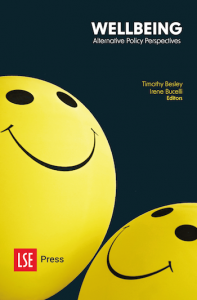In Wellbeing: Alternative Policy Perspectives – available open access from LSE Press – editors Timothy Besley and Irene Bucelli bring together contributors to explore how different disciplinary approaches can contribute to the study of wellbeing and shape policy priorities. Andrew Oswald recommends this excellent volume.
Wellbeing: Alternative Policy Perspectives. Timothy Besley and Irene Bucelli (eds). LSE Press. 2022.
 Wellbeing: Alternative Policy Perspectives is a valuable book. It has contributions by a number of distinguished researchers. The chapters are both cogent and highly readable. If you happen to come back from lunch to find that your office is on fire and you have time to snatch a single book, you might want to take this one.
Wellbeing: Alternative Policy Perspectives is a valuable book. It has contributions by a number of distinguished researchers. The chapters are both cogent and highly readable. If you happen to come back from lunch to find that your office is on fire and you have time to snatch a single book, you might want to take this one.
One reason is this: the book’s topic is so central to everything we see around us. It has been a paradox, and one I still cannot entirely explain, that all economists want their children to be happy and their spouses to be happy and their nations to be happy, but for eons they have been reluctant to measure the damn thing. As many researchers in the field are aware, the title of this edited book really should have ‘happiness’ in its title, but we have ‘wellbeing’ instead, which is ultimately okay by me.
Richard Layard begins the substantive chapters. He is both the eminent and natural person to do this as he has probably done more than any other academic in the world to push through, in a practical way, the use of wellbeing data as central to national policymaking. I hope that lots of open-minded economists and government ministers will read his chapter. Its message at a broad level is simple. We want policies that help our citizens to have happy and satisfying lives. So let’s think that through in planning a policy initiative, and then measure happiness and life satisfaction before and after a policy change.

Photo by Tim Mossholder on Unsplash
Floating at the back of all this, like a cheerful ethereal eminence grise, is a scholar called Richard Easterlin. He is still a Professor of Economics at the University of Southern California, although no longer giving lectures, and not too far from his 100th birthday. He started the study of wellbeing, as an approximation – yet strangely his name is not mentioned anywhere in this collection’s 200 pages.
I mention all this because policymakers have not faced up to the ‘Easterlin Paradox’. This is the fact, first shown by Easterlin in 1974, that through the decades the US has had higher and higher GDP but, paradoxically, the happiness numbers in repeated surveys show almost no improvement (there is equivalent evidence for other countries). Indeed, in the last decade or two, the level of happiness in the General Social Survey of the United States is on a clear downward trend. This finding is so undermining of most politician’s speeches about the economy that, to my knowledge, virtually no politician is willing to contemplate the upsetting facts of the data. I do not expect to see that unwillingness undergo any change in my lifetime, but one day it will have to alter, I suspect.
The closest I have seen to a good speech about such issues was given recently in Oxford by the Prime Minister of Iceland, Katrín Jakobsdóttir. She explained that people spend lots of their money on positional goods, which simply fails to raise the happiness of a society. It is a kind of ‘pollution’ (in the words of Layard, at that same conference) because my neighbour’s shiny new car is subconsciously designed to make me and others feel we have less worthy lives. There is only so much status – a fixed amount – to go around. We would thus have a happier country if the resources were instead put into green spaces, clean air, strong welfare safety nets in society, and so on.
At the time of writing, two politicians in my country, Liz Truss and Kwasi Kwarteng, believed that the way to have a happy country is to let people ‘keep more of their own money’, to be spent, presumably, on yet more positional goods. They are entitled to their belief, though a glance at the evidence would reveal that the happiest nations in the World Happiness Report have large public sectors and high tax rates. I imagine that a reckoning will arrive one day and that 200 years from now, the views held by most year-2022 politicians will seem muddle-headed and archaic.
Next up in the collection is Paul Dolan’s chapter. He seeks to explore the consequences of adopting wellbeing as a single, dominant metric to assess policy interventions. He advocates using the ‘wellbeing-adjusted life-year’ (WELLBY) concept for making cost-benefit decisions in policy choices. There is a fair amount to be said for that. Yet I retain one worry. It is philosophical, I suppose, and certainly takes me back to an undergraduate course I had to do in moral philosophy and the foundations of religion.
Let us say that a policy increases the lifespan of one person by one year. Is that good? Probably the person will think so. And there is an argument to say it truly is good. But we quickly run into swirling philosophical currents. Let us imagine, to try to think this through, that the UK has a population of 65 million people. Then imagine that it goes up by one extra citizen. Would you say that happiness/wellbeing has risen in the UK? This is the problem with putting Life Years into criteria. A year of life is like an extra person. I would favour measuring average emotions, not weighting by Life Years (but perhaps some of us have just done too much moral philosophy for our own good).
I will conclude by saying that I view Wellbeing as a really fine contribution, that the two editors Tim Besley and Irene Bucelli deserve our congratulations and thanks and that all the chapters are impressive work. I recommend this excellent volume.
Note: This review gives the views of the author, and not the position of the LSE Review of Books blog, or of the London School of Economics and Political Science.







